This review contains plot spoilers and is based on the UK edition of the ebook.
Puffin's series of short stories continues with something of a triumph for the sixth Doctor’s era. In Something Borrowed, US author Richelle Mead adopts the first person perspective of Ms Peri Brown, as well as having fun with the gaudiness of mid-80s Doctor Who (but not fun at its expense). Here, the Doctor and Peri visit the Koturians, a race who have been so inspired by their experience of Earth’s Las Vegas that they've modelled themselves on its culture. In place of the Strip there’s a “Swathe”, and even an Elvis impersonator turns up at one vital moment. But for all its energetic knowingness, Something Borrowed also refines its Who source material by setting out a coherent, well thought through storyline (not something that could always be said of the sixth Doctor’s TV outings, in my view).
Mead’s decision to use Peri as her viewpoint character means that the Doctor occasionally bursts in on proceedings and has to info-dump what he’s been up to, but on the whole it’s a gambit which further lends coherence and credibility to the tale. Peri’s American vantage point is (perhaps understandably) well realized, but there are also lovely little character moments such as her anxiety about being stared at by a crowd of wedding guests when she and the Doctor are about to intervene in one particular ceremony. Given the story’s title – and its Vegas-esque setting – it probably comes as little surprise to find that there’s a wedding at the heart of matters. But this isn’t Doctor Who-as-romance: nuptial themes are precisely and sharply integrated with a daring scheme that could transform the Doctor’s world (and even Doctor Who) as we know it.
The Doctor and Peri face a familiar nemesis, and though the identity of this villain is eminently guessable it is still a pleasure to encounter them, and in a well-written guise at that. The Doctor’s acerbic reworking of “something old, something new, something borrowed and something blue” may be rather mean, but it’s also very funny, and in keeping with this era’s focus on badinage. At one point the Doctor overcomes some henchman-type creatures (hench-creatures?), and you half expect him to toss out a Sawardian one-liner. But no, rather than caustically quipping, he pauses to express his regret (and I’d love to know if that moment emerged through an editorial note: it really does feel like a knowledgeable fan taking the time to ‘correct’ tonal worries rooted in long-term readings of the sixth Doctor).
The villain of the piece wants a Koturian groom as part of their capricious machinations to ‘borrow’ (OK, steal) something that’s lacking in “most” Time Lord’s capabilities (and the story fudges this by inserting “most” and “definitively” in its eventual explanation, thereby glossing over the debacle of a certain fourth Doctor Dalek story). But what’s most impressive is that while acknowledging details of fan knowledge here and there, the storyline still rockets along and everything dovetails neatly together in a logically and emotionally satisfying way. There are bits of dialogue you can almost hear Colin Baker’s voice saying, they fit so well into his Doctor’s character. And both Peri and the returning baddie are also well served. In light of what would happen later in the run of television stories, a casual threat about the possibility of the Doctor regenerating “sooner” than he might think also resonates rather smartly for the reader.
In terms of character, setting, alien culture, and its villain’s grandiose scheme, Something Borrowed hits all the right notes. Richelle Mead has lovingly borrowed a sometimes unloved period in Doctor Who’s rich tapestry, and not only restored its sense and sensibilities, but also stitched it back together in a new and somewhat improved pattern. Rarely has Peri been this three-dimensional a character. And although the TV programme had begun to recurrently plunder Time Lord lore by the mid-80s, it rarely did so in a particularly coherent manner (something brought home to me when rewatching The Two Doctors at the BFI recently). On this occasion, however, Mead’s handiwork makes judicious use of Time Lord capacities to power the overall storyline. “Impressive” really is the most apposite epithet for this month’s Puffin ebook.
Puffin's series of short stories continues with something of a triumph for the sixth Doctor’s era. In Something Borrowed, US author Richelle Mead adopts the first person perspective of Ms Peri Brown, as well as having fun with the gaudiness of mid-80s Doctor Who (but not fun at its expense). Here, the Doctor and Peri visit the Koturians, a race who have been so inspired by their experience of Earth’s Las Vegas that they've modelled themselves on its culture. In place of the Strip there’s a “Swathe”, and even an Elvis impersonator turns up at one vital moment. But for all its energetic knowingness, Something Borrowed also refines its Who source material by setting out a coherent, well thought through storyline (not something that could always be said of the sixth Doctor’s TV outings, in my view).
Mead’s decision to use Peri as her viewpoint character means that the Doctor occasionally bursts in on proceedings and has to info-dump what he’s been up to, but on the whole it’s a gambit which further lends coherence and credibility to the tale. Peri’s American vantage point is (perhaps understandably) well realized, but there are also lovely little character moments such as her anxiety about being stared at by a crowd of wedding guests when she and the Doctor are about to intervene in one particular ceremony. Given the story’s title – and its Vegas-esque setting – it probably comes as little surprise to find that there’s a wedding at the heart of matters. But this isn’t Doctor Who-as-romance: nuptial themes are precisely and sharply integrated with a daring scheme that could transform the Doctor’s world (and even Doctor Who) as we know it.
The Doctor and Peri face a familiar nemesis, and though the identity of this villain is eminently guessable it is still a pleasure to encounter them, and in a well-written guise at that. The Doctor’s acerbic reworking of “something old, something new, something borrowed and something blue” may be rather mean, but it’s also very funny, and in keeping with this era’s focus on badinage. At one point the Doctor overcomes some henchman-type creatures (hench-creatures?), and you half expect him to toss out a Sawardian one-liner. But no, rather than caustically quipping, he pauses to express his regret (and I’d love to know if that moment emerged through an editorial note: it really does feel like a knowledgeable fan taking the time to ‘correct’ tonal worries rooted in long-term readings of the sixth Doctor).
The villain of the piece wants a Koturian groom as part of their capricious machinations to ‘borrow’ (OK, steal) something that’s lacking in “most” Time Lord’s capabilities (and the story fudges this by inserting “most” and “definitively” in its eventual explanation, thereby glossing over the debacle of a certain fourth Doctor Dalek story). But what’s most impressive is that while acknowledging details of fan knowledge here and there, the storyline still rockets along and everything dovetails neatly together in a logically and emotionally satisfying way. There are bits of dialogue you can almost hear Colin Baker’s voice saying, they fit so well into his Doctor’s character. And both Peri and the returning baddie are also well served. In light of what would happen later in the run of television stories, a casual threat about the possibility of the Doctor regenerating “sooner” than he might think also resonates rather smartly for the reader.
In terms of character, setting, alien culture, and its villain’s grandiose scheme, Something Borrowed hits all the right notes. Richelle Mead has lovingly borrowed a sometimes unloved period in Doctor Who’s rich tapestry, and not only restored its sense and sensibilities, but also stitched it back together in a new and somewhat improved pattern. Rarely has Peri been this three-dimensional a character. And although the TV programme had begun to recurrently plunder Time Lord lore by the mid-80s, it rarely did so in a particularly coherent manner (something brought home to me when rewatching The Two Doctors at the BFI recently). On this occasion, however, Mead’s handiwork makes judicious use of Time Lord capacities to power the overall storyline. “Impressive” really is the most apposite epithet for this month’s Puffin ebook.

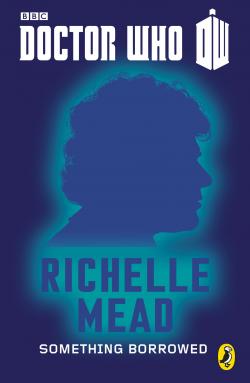
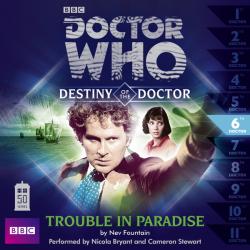
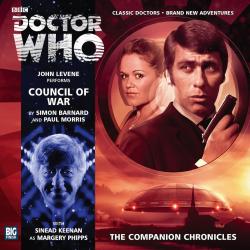
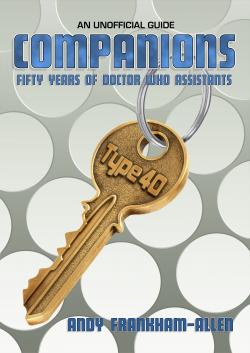
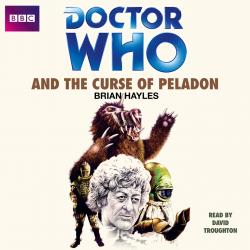
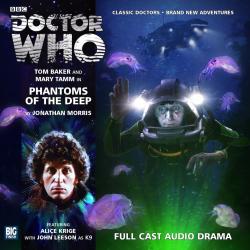

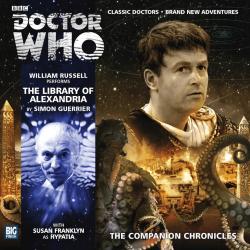
 Circle us on Google+
Circle us on Google+